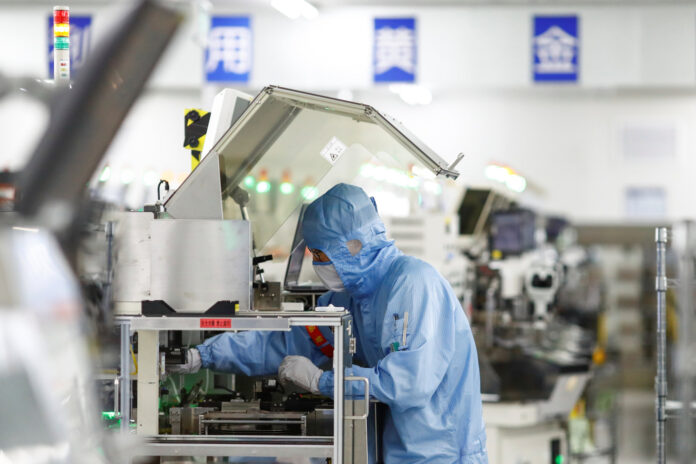The semiconductor manufacturing industry is the backbone of countless electronic devices. Given the state of countless possibilities surrounding this market, it’s easy to see why so many people are looking to invest in this industry.
According to DataHorizzon Research, the semiconductor market was valued at $605.1 billion in 2022. By 2032, this market will reach a value of $1299.6 billion.
If you’re considering venturing into this field, you’re entering a realm of complex processes, cutting-edge technology, and fierce competition. To help you navigate the challenges and lay a solid foundation for your semiconductor manufacturing business, here are a few key tips to consider.
1. Thorough Market Research

Before diving headfirst into semiconductor manufacturing, conduct comprehensive market research. Understand the current demand for semiconductor products, identify potential competitors, and analyze market trends. Semiconductor manufacturing is a capital-intensive business, and making informed decisions based on market insights is crucial for success.
Explore the specific niches within the semiconductor industry. Are you targeting consumer electronics, automotive, medical devices, or industrial applications? Right now, applications of semiconductors in the military industry are also a huge talking point.
In fact, as pointed out by Reuters, China aims to raise around $40 billion for its semiconductor sector. Much of the production from this sector will then be used by the Chinese military for various purposes.
Each sector has its unique requirements, and tailoring your approach to meet those needs can give you a competitive edge. Also, staying abreast of technological advancements and anticipating future trends is vital. The semiconductor industry evolves rapidly, and your business must be adaptable to emerging technologies to stay relevant.
2. Invest in Cutting-Edge Technology
Semiconductor manufacturing relies heavily on technological advancements. To stay competitive, you must invest in state-of-the-art equipment and technology. This includes advanced fabrication tools, cleanroom facilities, and equipment for testing and quality control.
Collaborate with reputable suppliers and manufacturers to ensure you have access to the latest technology. Keeping your manufacturing processes up-to-date not only enhances the quality of your products but also positions your business as an industry leader.
Also, make sure you’re investing in the best laser processing solutions. Laser cutting and defect identification are key parts of the semiconductor manufacturing process. From the laser generation process to the beam delivery, everything needs to be perfect if you want efficient and flawless semiconductors. Thus, invest in a laser processing machine that can provide you with all that.
According to Novanta Photonics, lasers used in the semiconductor industry must be highly precise and stable. The application of such a laser is not the same as the application of lasers in material processing. Here, more precision and stability are required as the slightest of defects can lead to a huge loss in efficiency.
If you want, you can also invest in laser research at a later point in your business. This is to ensure that the laser products that you use, like the beam delivery system, are giving you the expected results.
3. Skilled Workforce

Semiconductor manufacturing demands a highly skilled and specialized workforce. Assemble a team of professionals with expertise in various aspects of semiconductor production, including design, fabrication, testing, and quality assurance.
Invest in training programs to keep your employees updated on the latest technologies and industry best practices. Semiconductor technology is constantly evolving, and a knowledgeable workforce is essential for adapting to these changes.
The US semiconductor industry pays high salaries to those working in this sector, especially engineers. Indeed reports that a semiconductor engineer in the US earns around $99,090 a year. Thanks to such high salaries, it won’t be that difficult to attract talented individuals to work for your semiconductor business.
Fostering a culture of innovation and collaboration within your organization can also contribute to the success of your semiconductor manufacturing business. Encourage your employees to share ideas, participate in problem-solving, and contribute to the continuous improvement of processes.
4. Secure Financing and Establish Partnerships
Semiconductor manufacturing requires substantial upfront investments in equipment, facilities, and research. Securing adequate financing is crucial for the establishment and growth of your business. Explore various funding options, including bank loans, venture capital, government grants, and partnerships.
Establishing strategic partnerships with suppliers, research institutions, and other companies in the semiconductor ecosystem can provide additional support. These partnerships can lead to shared resources, collaborative research opportunities, and access to a broader network of industry stakeholders.
5. Strategic Marketing and Branding

Effective marketing and branding are essential for establishing a strong presence in the semiconductor industry. Clearly communicate your company’s value proposition, highlighting the quality and innovation that set your products apart.
Develop a compelling brand identity that resonates with your target audience. Attend industry conferences, trade shows, and networking events to showcase your products and connect with potential clients and partners.
Customer relationships are crucial in the semiconductor industry, where trust and reliability play significant roles. Provide excellent customer service, maintain open communication channels, and be responsive to customer feedback. Building strong relationships with clients can lead to repeat business and positive word-of-mouth referrals.
In conclusion, starting a semiconductor manufacturing business is a complex undertaking that requires careful planning, investment, and adherence to industry best practices. By sticking to the tips discussed above, you can successfully venture into this dynamic industry. Then, slowly but surely, you can position your semiconductor manufacturing business for long-term success and contribute to the ongoing advancements in technology.





![Calgary’s Hottest Neighborhoods for Luxury Homebuyers [2024]](https://thewashingtonote.com/wp-content/uploads/2024/04/Calgary-324x160.png)



